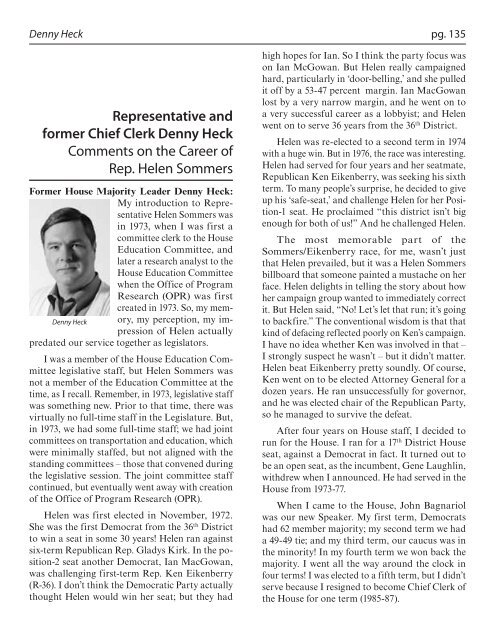Helen Sommers: An Oral History
Helen Sommers: An Oral History
Helen Sommers: An Oral History
You also want an ePaper? Increase the reach of your titles
YUMPU automatically turns print PDFs into web optimized ePapers that Google loves.
Denny Heck<br />
representative and<br />
former Chief Clerk denny heck<br />
Comments on the Career of<br />
Rep. <strong>Helen</strong> <strong>Sommers</strong><br />
Former House Majority Leader Denny Heck:<br />
My introduction to Representative<br />
<strong>Helen</strong> <strong>Sommers</strong> was<br />
in 1973, when I was first a<br />
committee clerk to the House<br />
Education Committee, and<br />
later a research analyst to the<br />
House Education Committee<br />
when the Office of Program<br />
Research (OPR) was first<br />
created in 1973. So, my mem-<br />
Denny Heck<br />
ory, my perception, my impression<br />
of <strong>Helen</strong> actually<br />
predated our service together as legislators.<br />
I was a member of the House Education Committee<br />
legislative staff, but <strong>Helen</strong> <strong>Sommers</strong> was<br />
not a member of the Education Committee at the<br />
time, as I recall. Remember, in 1973, legislative staff<br />
was something new. Prior to that time, there was<br />
virtually no full-time staff in the Legislature. But,<br />
in 1973, we had some full-time staff; we had joint<br />
committees on transportation and education, which<br />
were minimally staffed, but not aligned with the<br />
standing committees – those that convened during<br />
the legislative session. The joint committee staff<br />
continued, but eventually went away with creation<br />
of the Office of Program Research (OPR).<br />
<strong>Helen</strong> was first elected in November, 1972.<br />
She was the first Democrat from the 36 th District<br />
to win a seat in some 30 years! <strong>Helen</strong> ran against<br />
six-term Republican Rep. Gladys Kirk. In the position-2<br />
seat another Democrat, Ian MacGowan,<br />
was challenging first-term Rep. Ken Eikenberry<br />
(R-36). I don’t think the Democratic Party actually<br />
thought <strong>Helen</strong> would win her seat; but they had<br />
pg. 135<br />
high hopes for Ian. So I think the party focus was<br />
on Ian McGowan. But <strong>Helen</strong> really campaigned<br />
hard, particularly in ‘door-belling,’ and she pulled<br />
it off by a 53-47 percent margin. Ian MacGowan<br />
lost by a very narrow margin, and he went on to<br />
a very successful career as a lobbyist; and <strong>Helen</strong><br />
went on to serve 36 years from the 36 th District.<br />
<strong>Helen</strong> was re-elected to a second term in 1974<br />
with a huge win. But in 1976, the race was interesting.<br />
<strong>Helen</strong> had served for four years and her seatmate,<br />
Republican Ken Eikenberry, was seeking his sixth<br />
term. To many people’s surprise, he decided to give<br />
up his ‘safe-seat,’ and challenge <strong>Helen</strong> for her Position-1<br />
seat. He proclaimed “this district isn’t big<br />
enough for both of us!” <strong>An</strong>d he challenged <strong>Helen</strong>.<br />
The most memorable part of the<br />
<strong>Sommers</strong>/Eikenberry race, for me, wasn’t just<br />
that <strong>Helen</strong> prevailed, but it was a <strong>Helen</strong> <strong>Sommers</strong><br />
billboard that someone painted a mustache on her<br />
face. <strong>Helen</strong> delights in telling the story about how<br />
her campaign group wanted to immediately correct<br />
it. But <strong>Helen</strong> said, “No! Let’s let that run; it’s going<br />
to backfire.” The conventional wisdom is that that<br />
kind of defacing reflected poorly on Ken’s campaign.<br />
I have no idea whether Ken was involved in that –<br />
I strongly suspect he wasn’t – but it didn’t matter.<br />
<strong>Helen</strong> beat Eikenberry pretty soundly. Of course,<br />
Ken went on to be elected Attorney General for a<br />
dozen years. He ran unsuccessfully for governor,<br />
and he was elected chair of the Republican Party,<br />
so he managed to survive the defeat.<br />
After four years on House staff, I decided to<br />
run for the House. I ran for a 17 th District House<br />
seat, against a Democrat in fact. It turned out to<br />
be an open seat, as the incumbent, Gene Laughlin,<br />
withdrew when I announced. He had served in the<br />
House from 1973-77.<br />
When I came to the House, John Bagnariol<br />
was our new Speaker. My first term, Democrats<br />
had 62 member majority; my second term we had<br />
a 49-49 tie; and my third term, our caucus was in<br />
the minority! In my fourth term we won back the<br />
majority. I went all the way around the clock in<br />
four terms! I was elected to a fifth term, but I didn’t<br />
serve because I resigned to become Chief Clerk of<br />
the House for one term (1985-87).
















